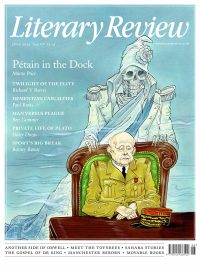Adrian Tinniswood
Who Needs Immanuel Kant?
Knowing What We Know: The Transmission of Knowledge – from Ancient Wisdom to Modern Magic
By Simon Winchester
William Collins 400pp £25
When I was a young philosophy student half a century ago, the theory of knowledge played rather too large a part in my life. Night after night, I struggled through Plato’s Theaetetus. I wrestled with Leibniz and Spinoza. I gave up on Kant’s Critique of Pure Reason and had nightmares about Hegel’s Phenomenology of Spirit. Then, just as I grasped the notion that knowledge could be defined as justified true belief (jauntily abbreviated to JTB), I was introduced to a paper by the American philosopher Edmund Gettier which seemed to demonstrate decisively that it couldn’t. It had something to do with Smith and Jones applying for the same job and Smith having ten coins in his pocket, if I remember rightly. But Gettier’s paper had two great advantages over the Theaetetus, the Critique and the rest. It was only three pages long. And I could understand it.
So I brought some epistemological scars to Simon Winchester’s new book and my trepidation increased as I saw that the lengthy prologue to Knowing What We Know was strewn with demons from my past. Plato and Kant, Hegel and JTB – they were all there. My hero, the lucid and oh so concise Gettier, got barely a passing mention. This is going to be a rough ride, I thought.
I couldn’t have been more wrong. Once Winchester gets into his stride, Knowing What We Know emerges as something much more exciting than a review of trends in epistemology. It is a rich and pensive exploration of how ideas have been transmitted, of how we know what we

Sign Up to our newsletter
Receive free articles, highlights from the archive, news, details of prizes, and much more.@Lit_Review
Follow Literary Review on Twitter
Twitter Feed
Margaret Atwood has become a cultural weathervane, blamed for predicting dystopia and celebrated for resisting it. Yet her ‘memoir of sorts’ reveals a more complicated, playful figure.
@sophieolive introduces us to a young Peggy.
Sophie Oliver - Ms Fixit’s Characteristics
Sophie Oliver: Ms Fixit’s Characteristics - Book of Lives: A Memoir of Sorts by Margaret Atwood
literaryreview.co.uk
For a writer so ubiquitous, George Orwell remains curiously elusive. His voice is lost, his image scarce; all that survives is the prose, and the interpretations built upon it.
@Dorianlynskey wonders what is to be done.
Dorian Lynskey - Doublethink & Doubt
Dorian Lynskey: Doublethink & Doubt - Orwell: 2+2=5 by Raoul Peck (dir); George Orwell: Life and Legacy by Robert Colls
literaryreview.co.uk
The court of Henry VIII is easy to envision thanks to Hans Holbein the Younger’s portraits: the bearded king, Anne of Cleves in red and gold, Thomas Cromwell demure in black.
Peter Marshall paints a picture of the artist himself.
Peter Marshall - Varnish & Virtue
Peter Marshall: Varnish & Virtue - Holbein: Renaissance Master by Elizabeth Goldring
literaryreview.co.uk